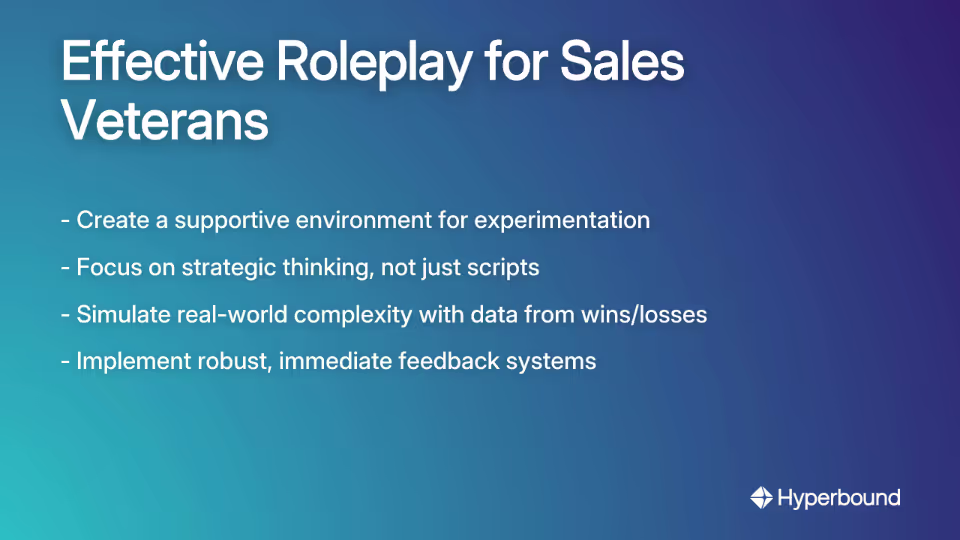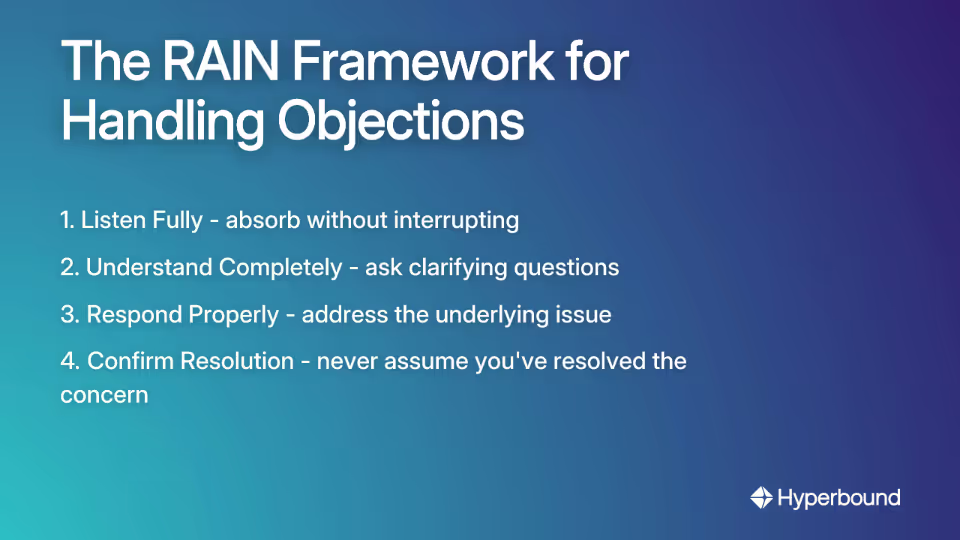
You've been through countless discovery calls. You've memorized the pitch deck. You've handled every standard objection in the book. And now, your sales manager wants you to participate in yet another roleplay session with the team.
"Not this again," you think to yourself.
For experienced sales professionals, traditional roleplay often feels like a waste of precious selling time. It's awkward, scripted, and rarely mirrors the complex scenarios you face daily with real prospects. As one veteran rep put it in a recent discussion: "Role play can be helpful to an extent but often fake and weird."
But what if roleplay could actually challenge your skills and prepare you for those high-stakes situations that make or break your quarter?
Why Standard Roleplay Fails Your Best Reps
Traditional sales roleplay typically falls short for tenured representatives for several key reasons:
- Lack of complexity: Basic "sell me this pen" scenarios don't reflect the intricate, multi-stakeholder deals you navigate daily.
- Unrealistic responses: As one sales professional noted, "Most assigned role play partners don't do it well. As in they aren't pushing the no realistically and after the objection is handled, get a high five and then it's the next person's term."
- Absence of real stakes: Without consequences, roleplay can become a theatrical production rather than valuable practice.
- Fear of vulnerability: For SDRs and account executives alike, roleplay often exposes vulnerabilities in front of peers, creating a negative reinforcement environment instead of building confidence.
The good news? There's a better approach.
Transforming Roleplay into Strategic Simulation
Advanced roleplay isn't about memorizing scripts—it's about developing the strategic thinking and adaptability required to handle complex, high-pressure sales situations. Here's how to reframe the practice for your most seasoned team members:

- Create a supportive environment: Foster a culture where experimentation is encouraged and mistakes are viewed as learning opportunities, not failures. As one rep emphasized, "If you have coworkers or managers that make you feel like shit about it, then that's a separate problem altogether."
- Focus on strategic thinking: Move beyond "what to say" to "how to think" in complex scenarios.
- Simulate real-world complexity: Use data from recent wins and losses to create hyper-realistic scenarios that challenge even your most experienced team members.
- Implement robust feedback systems: Provide immediate, constructive feedback focused on strategy, not just tactical execution.
12 Advanced Roleplay Scenarios for Sales Veterans
Ready to elevate your team's roleplay from basic to challenging? Here are 12 scenarios designed specifically for tenured sales professionals, organized by key challenges they're likely to face:
High-Stakes Negotiation & Pricing
1. The Price Haggler on Steroids
- Scenario: Your prospect claims a competitor offered the same solution for 35% less and has an official quote to prove it.
- Challenge: Uphold your value proposition without disparaging the competition while negotiating effectively.
2. The Power Balance Shift
- Scenario: After months of work, your deal is set to close tomorrow when the prospect calls: "We just got a last-minute offer from your competitor with a new feature we might need. What can you do?"
- Challenge: Regain control of the negotiation without unnecessary concessions.
3. Mixed-Motive Bargaining
- Scenario: The client wants custom development that would pull resources from your core product roadmap.
- Challenge: Find a win-win outcome that maintains the relationship while protecting strategic interests.
Navigating Stakeholder & Organizational Complexity
4. The Sudden Change in Decision-Maker
- Scenario: Your champion leaves the company. Now you must re-sell to a new, skeptical executive with preferred vendors.
- Challenge: Quickly build rapport and maintain deal momentum.
5. The Multi-Stakeholder Melee
- Scenario: In a final presentation, the CEO (focused on ROI), CTO (concerned with security), and end-user manager (prioritizing usability) start debating different priorities.
- Challenge: Find common ground and unify the group around a shared vision.
6. The Stalled Deal Revival
- Scenario: A promising opportunity has gone dark for 60 days despite multiple follow-up attempts.
- Challenge: Identify the root cause and deploy a strategy to reignite interest without appearing desperate.
Handling High-Pressure "Curveballs"
7. The Unexpected Budget Cut
- Scenario: "I love your solution, but my budget was just slashed by 40%. Can we still make this work?"
- Challenge: Adapt quickly with creative solutions while maintaining value perception.
8. The Feature Fanatic
- Scenario: The prospect is fixated on a niche feature your product doesn't have and won't be building.
- Challenge: Pivot from features to outcomes, demonstrating how your existing solution better addresses their core business problem.
9. The Skeptical Prospect
- Scenario: "We tried something similar before and got burned. Prove this is different."
- Challenge: Build trust with evidence-based selling without becoming defensive.
These scenarios move beyond "baptism by fire" roleplay and create structured opportunities for sales professionals to develop muscle memory for handling the most challenging situations they'll face in the field. Regularly practicing these advanced scenarios has been shown to significantly improve close rates on complex deals.
A 4-Step Framework for Handling Any Objection

For these advanced roleplays to be effective, tenured sales reps need a structured approach to navigate objections. The RAIN framework provides an excellent mental model:
1. Listen Fully to the Objection
- Practice absorbing the entire concern without interrupting or mentally formulating your response.
- Use non-verbal cues to demonstrate active listening.
2. Understand the Objection Completely
- The first objection is rarely the real one. Practice asking clarifying questions:
- "Can you tell me more about that concern?"
- "What specific aspect of this gives you pause?"
3. Respond Properly
- Address the underlying issue with a clear, concise response.
- Avoid rambling, which signals lack of confidence in your answer.
4. Confirm You've Satisfied the Objection
- Never assume you've resolved the concern. Ask directly:
- "Does that address your question about [specific objection], or is there something else we should explore?"
This framework transforms objection handling from an awkward exchange into a strategic conversation that builds trust through the sales process.
Beyond Basics: Advanced Negotiation Techniques
For experienced sales reps, negotiation is where deals are won or lost. Research highlights several advanced techniques that should be incorporated into your roleplay scenarios:
Offering Strategic Trades
- Practice scenarios where you exchange low-cost concessions (for you) for high-value gains (for your company).
- Example: "If we extend implementation support to 90 days, would you be comfortable with a three-year contract?"
Knowing When to Walk Away
- This critical skill separates top performers from average ones.
- Roleplay scenarios where the prospect's demands become unreasonable, and practice professionally disengaging while keeping the door open.
Controlling the Frame
- When price pressure mounts, practice redirecting conversations back to value and business outcomes.
- "I understand budget is a concern. Let's revisit the ROI calculation to ensure we're capturing all the value this solution will deliver."
The AI Co-Pilot: Elevating Practice with Technology
The emergence of AI is transforming how sales teams approach roleplay. However, not all AI tools are created equal. While some reps use basic AI for practice, many find it lacking. As one sales professional noted of simpler AI, "I found it a bit unrealistic for B2B sales role-playing... which it doesn't really handle well."
This is where sophisticated AI sales coaching platforms like Hyperbound make a difference. Instead of generic chatbots, these platforms analyze your own winning sales calls to create hyper-realistic AI Roleplays. This allows reps to practice against AI buyers who are armed with relevant objections and questions, mirroring real-world conversations.
The benefits of this advanced approach include:
- A judgment-free environment for unlimited, on-demand practice.
- Realistic scenarios that build muscle memory for complex deals.
- Scalable coaching powered by your own sales playbook.
- Objective, data-driven feedback to pinpoint areas for improvement.
The verdict? Advanced AI is no longer just a supplement. It’s a powerful co-pilot that prepares reps for the nuance and adaptability required in today's market, ensuring they are ready for any conversation.

From Dreaded Exercise to Strategic Advantage
For tenured sales representatives, roleplay doesn't have to be a waste of time. When designed correctly, it becomes a powerful tool for sharpening the advanced skills needed to win competitive deals.
As one sales veteran put it, "It's like going to the gym, or meditating. It's hard, and most people will avoid it and not reach their full potential."
The most successful sales professionals understand that mastering complex client pitches, handling unexpected objections during discovery calls, and navigating high-stakes negotiations requires consistent practice in realistic scenarios.
By transforming roleplay from basic script recitation to strategic simulation, you give your experienced team members the opportunity to:
- Refine their approach to complex, multi-stakeholder deals
- Practice handling the toughest objections they'll face in the field
- Develop the confidence to navigate high-pressure situations
In today's increasingly competitive sales landscape, the difference between good and great often comes down to how effectively your team handles those critical moments in the sales process. Advanced roleplay ensures they're ready when it matters most.
Frequently Asked Questions
Why does traditional sales roleplay often fail for experienced reps?
Traditional sales roleplay often fails experienced reps because it lacks the complexity, realism, and high stakes of their actual sales interactions. Scenarios are often too simple, partners don't provide realistic pushback, and there are no real consequences, making it feel like a theatrical exercise rather than valuable practice. This can lead to disengagement and a feeling that it's a waste of time for seasoned professionals.
How can I make sales roleplay more effective and realistic?
To make sales roleplay more effective, focus on transforming it into a strategic simulation. This involves using data from recent wins and losses to create hyper-realistic scenarios that mirror the complex, multi-stakeholder deals your team actually faces. Emphasize strategic thinking over script memorization and foster a supportive environment where reps can experiment and receive constructive feedback.
What is the RAIN framework for handling sales objections?
The RAIN framework is a four-step method for structuring your response to any objection: Listen Fully to the concern without interrupting, Understand Completely by asking clarifying questions to find the root cause, Respond Properly with a concise answer to the underlying issue, and Confirm Resolution by asking if you've satisfied their concern.
How can AI improve sales roleplay for senior teams?
AI can significantly improve sales roleplay by providing a scalable, non-judgmental, and highly realistic practice environment. Sophisticated AI coaching platforms can analyze your own sales data to create AI buyers who use relevant objections and mirror real-world conversations. This allows reps to practice complex scenarios on-demand and receive objective, data-driven feedback to hone their skills.
What are some examples of advanced roleplay scenarios for sales veterans?
Advanced roleplay scenarios should challenge veteran reps with situations they regularly encounter. Examples include handling a prospect who claims a competitor is 35% cheaper, navigating a sudden change in the decision-maker mid-deal, reviving a stalled opportunity, or managing conflicting priorities among multiple stakeholders in a final presentation.
How do you create a psychologically safe environment for sales roleplay?
Creating a psychologically safe environment for roleplay starts with leadership framing mistakes as learning opportunities, not failures. Emphasize that the goal is practice and development, not performance evaluation. Encourage experimentation, ensure feedback is constructive and focused on strategy, and foster a culture where reps feel comfortable being vulnerable and tackling difficult scenarios with their peers.
Are you ready to elevate your sales training beyond the basics? Start implementing these advanced scenarios and frameworks today, and watch as your team's confidence—and results—reach new heights.
Book a demo with Hyperbound
.png)













